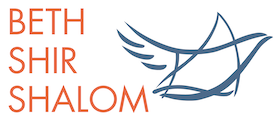APRIL 9, 2021 By RABBI ALEX KRESS

When I was 2, my dad stood in front of a lightbox holding an X-ray that confirmed his mother was dying of lung cancer. As her first
yahrtzeit approached, my dad felt a yearning to observe the mourning rituals of Judaism.
My mom, who was not Jewish and had no plans to convert, stayed home with my infant sister and me so my dad could attend Shabbat
services for the first time in decades. Just before the closing blessings, the rabbi preached a sermon warning of the moral catastrophe of intermarriage and the impending havoc it would wreak on the Jewish people. His stinging words
repulsed my father.
This story of someone showing up to partake in Jewish ritual and being made to feel unwelcome is all too familiar.
We read of a similar tale in Parashat B’haalot’cha, in which Miriam and Aaron speak out against Moses’ life choices: “He married a
Cushite woman” (Numbers 12:1). Our tradition identifies this woman as either Tzipporah, Moses’ wife in Exodus, or perhaps a different wife from Egypt. In either case, the argument is clear: The non-Israelite woman is an outsider, looks different, and is not worthy of marrying into our exclusive club. Whether it is her religion, skin color, or some other supposed fault, her “otherness”
is too much for Miriam and Aaron to countenance.
Too many of us harbor such chauvinistic attitudes, consciously or unconsciously. We take pride in how many Nobel Prize winners are
Jewish, and lately how many Jews played a role in developing COVID-19 vaccines. When we learn someone is in a new relationship, we ask of the partner, “Are they Jewish?” The more vulgar among us make jokes about the goyim (the derogatory Yiddish word for people who are not Jewish). When they see Jews of Color in the synagogue for services or an event, they assume they are part of
the janitorial staff. When they see anyone outside of their Ashkenormative perception of who is a Jew, they turn into Aaron and Miriam and say, “You aren’t like us.” Every action or comment that makes someone feel “other” adds a brick to the wall of exclusion.
As our Torah portion makes clear, there is no room for exclusivity in our community.
God, irate that they would criticize Moses, descends upon Aaron and Miriam in a cloud. When the cloud departs, Miriam is stricken with
tzaraat, the scaly skin ailment associated with punishment for slander (Sifra Mtzora 5:7). The Torah tells us that “Miriam was shut out of the camp for seven days, and the people did not march on until Miriam was readmitted” (Numbers 12:15). In other words, Miriam was forced outside the very boundaries she was attempting to erect and enforce.
To recover from the illness brought on by her actions, and also for the community to move on, Miriam, not Moses or his wife, had to leave the community. This is a lesson in radical inclusivity.
In a world in which, according to the Pew Research Center, 72% of non-Orthodox marriages are interfaith, we must dispel exclusionary
attitudes toward others. We must not be silent when we hear people in our community espouse ideas and language that make others feel unwelcome. When we poison the ground on which we build holy space through word or action, we undermine the very project of creating a sacred community. When we passively or actively make people feel different, we thumb our nose at God in whose image we
are all made.
I was lucky that my parents persisted and found a spiritual home that welcomed our interfaith family. Yet all too often, those we
greet with hostility leave forever. Not only does rejection of “the other” violate the sanctity of all human beings, it seriously undermines Jewish continuity.
Though we have made great strides in accepting interfaith families, there is more work to be done in lowering barriers to those who show up at our doors seeking community. Our responsibility is to include, not judge, all who wish to be part of our community and share our sacred values. As the saying goes, we must build longer tables, not higher walls.

